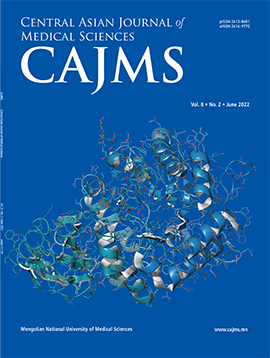The Efficacy of Intravitreal Bevacizumab in Neovascular Age-Related Macular Degeneration
DOI:
https://doi.org/10.24079/cajms.2022.12.007Keywords:
Best-Corrected Visual Acuity, Optical Coherence Tomography, Age-Related Macular DegenerationAbstract
Objective: To study the effect of cataract surgery with intravitreal bevacizumab therapy on visual and anatomical outcomes in patients with neovascular age-related macular degeneration (AMD) in Mongolian patients. Methods: A retrospective analysis of 72 eyes of 36 patients with neovascular AMD evaluated intravitreal bevacizumab (1or2.5 mg) injections. Retreatment was performed following an optical coherence tomography (OCT)-based regimen. Ophthalmic examination included best-corrected visual acuity (BCVA), dilated fundus examination, and OCT image analysis. Results: A total of 11 patients received cataract surgery. We could not observe statistical significance between the two groups. The BCVA of the right eye of patients having cataract surgery improved by 0.21 ± 0.29, while the corresponding value for patients without surgery was 0.32 ± 0.32. The mean central retinal thickness (CRT) of patients with refraction was decreased from 264.4 ± 82.32 μm at baseline to 244.55 ± 52.59 μm for the right eye, while it was 275.4 ± 96.4 μm at baseline to 276.36 ± 68.22 μm for the left eye. Conclusion: Cataract surgery with intravitreal bevacizumab therapy in eyes with neovascular AMD in aged patients was performed.
Downloads
245
Downloads
Published
How to Cite
Issue
Section
License
Copyright (c) 2022 Mongolian National University of Medical Sciences

This work is licensed under a Creative Commons Attribution-NonCommercial 4.0 International License.




